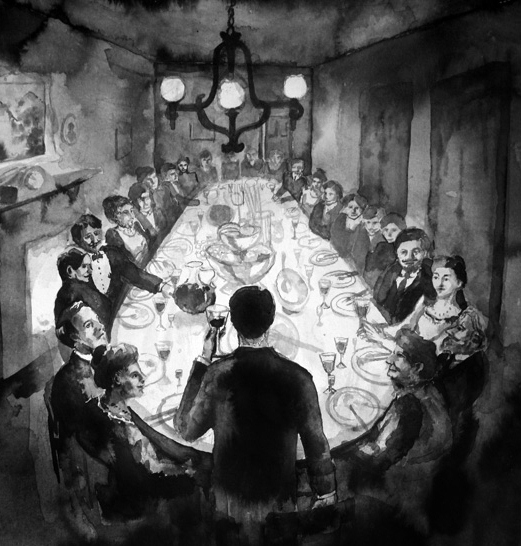The Unbearable Lightness of Being
 Tuesday, January 15, 2008 at 01:20
Tuesday, January 15, 2008 at 01:20  Waves of politics and philosophy undulate through The Unbearable Lightness of Being, but at the core swims a young couple, Tomas and Tereza, who are trying to make sense of that most human condition of all, morality. They are joined in their quest by two more main characters: Sabina, who is Tomas’s lover, and Franz, who is also Sabina’s lover. The four live in awareness of one another, but perhaps not in acceptance, and each embodies, with his or her profession, one field of human knowledge. Franz is a university professor and the most distant from the incredible ecstasy of art; he finds solace in politicized protests and sewn–on labels such as “dissident,” “immigrant,” and “radical change.” Tomas is a physician and an inveterate rake, but his aesthetic sense perseveres through bouts of wanton behavior and even justifies his emotional immaturity in a German aphorism. Tomas is clearly superior to Franz in every way, and the reader cannot but smirk when Franz feels burdened by his Philistine wife and bourgeois existence, while Tomas continues to enjoy whatever skirt he can crawl his way under. Sabina and Tereza, meanwhile, are slabs from the same quarry. They even pursue variants of the same vocation: Sabina is a painter and Tereza a professional photographer. They are the pictures for Tomas’s captions, the film for his voiceover. And both of them adore Tomas for his alleged strength and freedom of spirit, yet acknowledge that these traits only cloak a fear to commit, a fear to love completely and absolutely, and that most primal of male anxieties, the fear of giving up all the earth’s women to receive, in return, only one. How can one woman possibly compensate for the plenitude of all the rest? In a way, this is the novel’s essential question. One may do well to substitute “life” or “soul” for “woman” and ask the question again.
Waves of politics and philosophy undulate through The Unbearable Lightness of Being, but at the core swims a young couple, Tomas and Tereza, who are trying to make sense of that most human condition of all, morality. They are joined in their quest by two more main characters: Sabina, who is Tomas’s lover, and Franz, who is also Sabina’s lover. The four live in awareness of one another, but perhaps not in acceptance, and each embodies, with his or her profession, one field of human knowledge. Franz is a university professor and the most distant from the incredible ecstasy of art; he finds solace in politicized protests and sewn–on labels such as “dissident,” “immigrant,” and “radical change.” Tomas is a physician and an inveterate rake, but his aesthetic sense perseveres through bouts of wanton behavior and even justifies his emotional immaturity in a German aphorism. Tomas is clearly superior to Franz in every way, and the reader cannot but smirk when Franz feels burdened by his Philistine wife and bourgeois existence, while Tomas continues to enjoy whatever skirt he can crawl his way under. Sabina and Tereza, meanwhile, are slabs from the same quarry. They even pursue variants of the same vocation: Sabina is a painter and Tereza a professional photographer. They are the pictures for Tomas’s captions, the film for his voiceover. And both of them adore Tomas for his alleged strength and freedom of spirit, yet acknowledge that these traits only cloak a fear to commit, a fear to love completely and absolutely, and that most primal of male anxieties, the fear of giving up all the earth’s women to receive, in return, only one. How can one woman possibly compensate for the plenitude of all the rest? In a way, this is the novel’s essential question. One may do well to substitute “life” or “soul” for “woman” and ask the question again. If all this seems vague and meandering, think of it as a symphony. After all, that is how Kundera, the son of a well–known Czech musicologist, loves to characterize his works. He himself once studied composition, and musical references, liner notes, and tidbits of musical history are scattered throughout his writings. He is particularly fond of the granddaddy of bombast, and a famous quote from the musical genius is repeated throughout the novel. The plot, if one may call it that, is furnished by the events of the Prague Spring and its aftermath. The historical happenings are as meaningless for the characters as stage props. They may stumble and injure themselves on them, even mortally, but nothing can ingress their substance, because the substance of each of them (except, arguably, that of Franz) is entirely outside of any plot or material life. Someone at one point or another must have already dubbed The Unbearable Lightness of Being a “waltz of souls,” or something to that effect. If no one has, then I will be happy to use that designation.
On the back cover of the first English version of the novel (translated by this renowned Slavist), one reviewer calls Kundera “an intellectual heavyweight,” which, in my humble opinion, he most certainly is. But the philosophy in the novel is threadbare, and can be whittled down to the simple statement: if our decisions have no consequences because they repeat infinitely, are we freer or more enslaved? The question is worth asking, and a topic for students of ethics. But more important is whether one life, or soul, or woman (which, if she is loved completely and absolutely, can be a life or soul) can matter in the face of churning time. These characters, called in some places “Kundera's quartet,” represent science, academe, art, and journalism (Tereza’s photographs inevitably chronicle the tumult of 1968), with Soviet tanks providing the military segment. They become the polyphony of Czech society itself, although it doesn’t need to be Czechoslovakia or 1968 for us to get the idea. Woven between and among things they could not possibly impact or control, they are both triumphant and trampled underfoot. They both sublimate and disintegrate, and sometimes it is hard to predict exactly how the fates will turn given all the decisions that have to be made along the way. A constant pendulum between light and heavy, which may explain the oxymoron of the novel’s title.
What then of Kundera the “sexist”? If you are familiar with Kundera’s ten works of prose fiction, you know that he likely sides with the Don Juans of life, perhaps being one himself, although that needn’t concern us here. It is women, however, that he sees differently. He believes, or will have us believe, that women were more liberated before the sexual revolution because they retained their mystique. Does anyone, he might ask, ever compose odes to a woman’s beauty any more? Can love for a woman in Western society ever be separated from enjoying her womanhood without inducing mockery? In a way, such discourse is an oversimplification, because the liberation of women over the last hundred years has to do with much more than sex. But Kundera is steadfast in his portrayals of modern women: he sees them as equals, yet society certainly does not. He gives them as much intelligence and fortitude as his male characters then watches them fail. Whether this makes him a sadist, a sexist, or someone who yearns for the days when women and love could be safely placed above lascivious urges, is a matter of perspective. Sabina and Tereza are the true heroes of The Unbearable Lightness of Being. They are braver and smarter than everyone else in the novel, but society expects less talent and more prudence on their part. And so they fail. And had they succeeded, they might have spared us a lot of nose–twitching.
 Kundera in
Kundera in  Book reviews,
Book reviews,  Essays,
Essays,  French literature and film
French literature and film 




